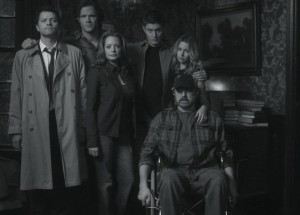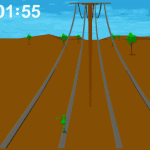you know, as much as i had never thought of myself as one, i found myself proudly putting my hand up in this weeks lecture when adrian asked who in the crowd considered themselves a gamer. i guess i’m not a gamer in what most people think of the term. i don’t sit on my computer or my console playing games 24/7, i don’t shoot

other people from across the globe, or battle them in magical duels over the internet. but i do play my games (more often now than i did in high school thats for sure) and i do love them. even if it really is only one or two games that i actually play (*cough* pokemon and kingdom hearts *cough*).
first off, there are many types of video games, and all of them are different (and this doesn’t count all the games that aren’t video games) so it’s hard to be able to make an overall, wholesome statement about all video games being hypertext or not. i think it was Elliot who mentioned that when hypertext first came around, people started calling it a video game. but there’s a difference. a video game, even if it does have a word that you can explore, is still set in it’s story (if it even has one, but we’ll get to that) whereas a hypertext can have nearly limitless possibilities, the story doesn’t have to result in this one specific conclusion like a video game. BUT! as Jasmine then pointed out, when playing a game, there can always be parts of the game that you haven’t yet explored or discovered and this is like hypertext, you cannot see all the possible paths. but is this enough of a connection?so, “what relevance does this have?” i hear you ask. well, you inquisitive reader you. one of the big points discussed in this weeks lecture was whether a video game can be considered a hypertext narrative. and there were so many differing opinions coming out from the symposium too. we had a resounding “NO!” from one side of the table and a yes! from another and then kinda just landed in the middle. so let me break down the points for you
i’m not sure. adrian emphasised the necessity of story and narrative within both the hypertext and the game. well, mainly that a hypertext does have a narrative but a game doesn’t have too. i mean yes, some do, but there are other games that obviously don’t have a narrative, like pong. or tetris. so where hypertext is about new and different ways of telling a story, a game doesn’t even have to have one, so how can it be a hypertext narrative? another point that adrian brought up was that “games are about winning” and that “you can’t win a story”. but, when you read a story,

isn’t reaching a positive outcome within the story kinda like winning? i mean, you want the outcome to be good and when it it you feel as if you have won. i guess it’s still different types of winning. but with a video game that has a narrative rather than a competitive or points system, there’s also no real definite “win”. does beating the game mean you have won or just completed it like you have completed a story? take kingdom hearts for example, you play a single character, sora, and your quest is (in simple terms) to bring peace to pretty much everywhere. yeah, there’s fighting along the way, and you can win those individual battles, but when you complete the story, is that really “winning” or have you just reached the conclusion of the narrative? and some games you never win. like tetris or temple run, the aim is just to keep going for as long as you can, so really you’re only option is lose, there is neither a “win” nor a narrative conclusion. so really, there really is no proper way to answer this question. because there are too many different types of games to classify anything. as long as we keep playing and reading, does it really matter?
just one more small note from the lecture, i really liked Adrian’s point about the meaning not living in the text (or shot, as his example was in film) but in the combination of two shots or links between the texts. on it’s own, a text is nothing (similar to the theory that context cannot survive) but it must be combined with something else to have a meaning and different combinations can have different meaning. this reminds me of something we covered last semester in cinema studies about editing, what is known as the Kuleshov Effect and pretty much is about how the meaning of a shot can be altered completely by the following shot. check out this video below from none other than alfred hitchcock for a much better explanantion.
that’s all from me now, a bit long this post was. i guess there was a lot to talk about.



 they do it better than most actual comedy shows out there (check out “changing channels” (season 5) or “the french mistake” (season 6) to see what i’m talking about). with an incredible mix of drama, horror, comedy and action, supernatural has kept it’s cult audience entertained for a full 8 seasons and is still going strong.
they do it better than most actual comedy shows out there (check out “changing channels” (season 5) or “the french mistake” (season 6) to see what i’m talking about). with an incredible mix of drama, horror, comedy and action, supernatural has kept it’s cult audience entertained for a full 8 seasons and is still going strong.
